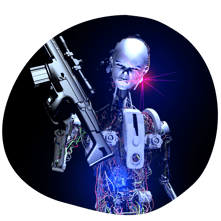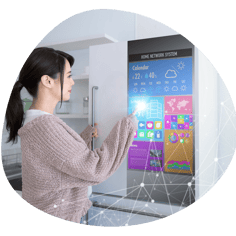When we asked a few folks in healthcare what their initial reaction to the words ‘artificial intelligence’ was, here is what they said:
“A computer figuring out everything for me.” - Ryan Hartman, AGPCNP-BC
.png?width=221&name=smart%20computer%20(1).png)
“Not something good. Something fictitious and mechanical like from a movie that has been given thoughts and feelings and is on an evil mission.” - Lisa Turtz, MSW

“I very randomly think of the Disney movie Smart House where the family is excited to live in a computerized house and then things start to go wrong. It seemed like such an unrealistic thing at the time… I also think of my car driving itself, which would be clutch.” - Ashley Marchante, PhD

Given the recent hype along with the breadth of applications of artificial intelligence (AI), it is no surprise that us mortals tend to approach AI with a mix of apprehension and awe. This can easily produce expectations that don’t quite match reality.
Expectations
A few common expectations of AI include:
AI will take all the jobs.
AI will eventually be smarter than us.
AI will take over the world and render humans obsolete.
Said aloud, these expectations of AI sound slightly ridiculous, but fit the picture painted by movies and books for the general public (here is a quick refresher on what AI is and how it can improve healthcare). Those of us who do not work intimately with AI tend to see it at exaggerated ends of a spectrum - evil machines taking over the universe or silly computers that can never match human capabilities.
The truth is, neither of these fantasies are quite reality.
Reality
Fortunately and unfortunately, artificial intelligence has some limitations to what it can become. As someone who is patiently waiting for a robot to do all the dishes and fold the laundry for the price of electricity, this is a bit of a bummer.
While artificial intelligence’s synthetic neurons can mimic the neural networks of the human brain, it can never truly know what it is to be human. While patients come to see their doctors for many practical reasons - refills, diagnosis, advice, therapy - they also come for many supremely human/squishy ones, such as the healing touch of another human being that understands what it means to get sick, to hurt, and to be mortal. For the scared cancer patient discussing options with his or her surgeon, sometimes the goal isn’t learning the data and facts. Rather, the patient's desire is to ask another person who can empathize with the fear and myriad of complex feelings surrounding their situation. Simply needing to ask, “What would you do?” and have the provider actually be able to consider how they, too, could be in that situation and what they would choose for themselves.
The neural networks of artificial intelligence must be trained to recognize patterns and this is accomplished through millions and millions of data inputs laboriously labeled by humans. It is true that the more data that is received, the quicker and better the artificial intelligence learns ‘on its own’. Yet, it is important to consider that artificial intelligence is trained to solve classification problems, not problems that require critical, creative, or abstract thinking. What artificial intelligence does not possess is the capability to feel emotions, which is a huge driver of human intelligence and decision making (here is a great video breaking this down).
Since science still does not truly understand all the complexity and nuances of the human brain and how we learn, there is simply no way we can train a machine to be like us in all ways at all times. For some this is great news, as it means robots will not be taking over the world any time soon given humans are still very much in control of the machines. For others, this may come as a disappointment (yep, I am still waiting for that laundry folding, dish washing robo-maid). Ultimately, as artificial intelligence becomes more and more a part of our lives, it is best we understand its capabilities and limitations so we can maximize its (and our) potential.
Maximizing Potential: Humans and AI Working Together
In the words of PredictionHealth CEO, Pedro Teixeira, “Humans are great at certain things … But computers are great at completely different things.” While that may seem like an obvious and overly simplified statement, from a high level perspective it is very true and quite convenient! Computers can process billions of inputs to consistently produce the outputs in seconds, something our human brains could never compute. But artificial intelligence will never have the same beautiful, unique, and complex human experience.
The greatest reality we can imagine with artificial intelligence is one where it augments human ability with its computational power. Humans and artificial intelligence together can solve a lot of complex problems and change our lives and world for the better. Our favorite example is of PredictionHealth’s AI-assisted Scribing service that turns patient encounters into high quality documentation and medical insights. Providers can focus on and treat the patient rather than take notes and worry about sifting through massive amounts of data in the patient chart to find medically relevant information. Through this partnership, providers have time to actually practice medicine while patients receive the best care.
The Takeaway
Regardless of what your previous notion of artificial intelligence was, hopefully you now have a more grounded understanding of artificial intelligence and its capabilities and potential. The future of artificial intelligence is certainly bright. That does not mean we should approach it with fear or fantasy, but cautious excitement.
Perhaps the most eloquent response received to the natural reaction to artificial intelligence question - and a perfect summation - was the following;
"AI simultaneously makes me really excited and also cautious. There is so much potential to do great things: we can increase efficiencies; we can empower people to make healthier and more informed decisions. But for all of the exciting new insights brought to our fingertips by AI technology, we also need to be wary of potentially harsh consequences: the disparate impacts on vulnerable populations or the dangers that stem from not thinking critically about the answers we get from computers. AI is where we're headed and it's terribly exciting, but - like all great explorers - let's not forget to bring along a healthy dose of skepticism and persistent vigilance."
-Martha Wrangham, Director of Compliance, Reify Health